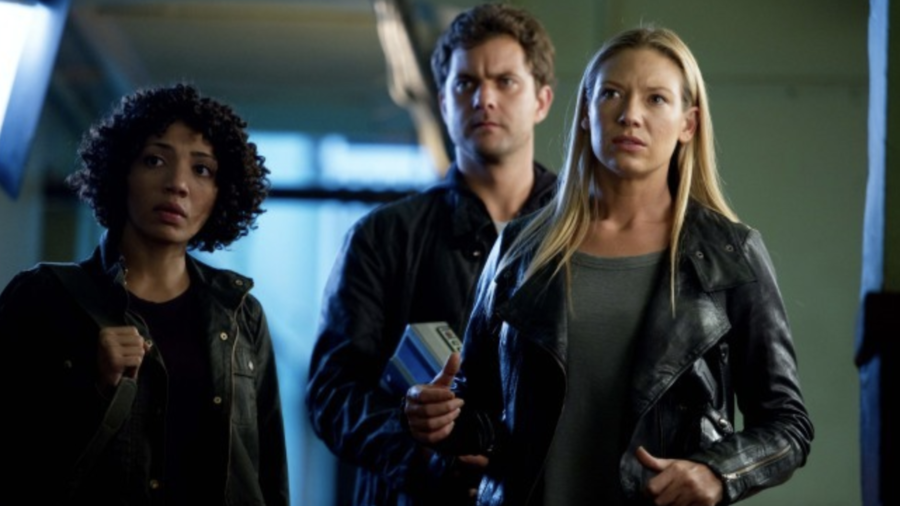Fringe Post-Game: Through The Looking Glass And What Walter Found There

Nothing summarizes the Fringe episode, “Through the Looking Glass and What Walter Found There,” as well as Peter’s (Joshua Jackson) line, “Walter is full of surprises today.” That one sentence captures the main narrative thrust of the sixth show in the fifth and final season.
Shenanigans are par for the Fringe course when it comes to Walter (John Noble). The batty mad scientist is prone to getting into all sorts of trouble, though this usually involves penetrating parallel dimensions, or coming up with crazy ideas while under the influence of a generous dose of hallucinogens. In “Through the Looking Glass,” however, the problems are a bit more serious.
Unable to sleep, and driven by urges he doesn’t fully understand, Walter digs the latest tape—containing clues about how to defeat the Observers—out of the amber. Without waiting for Peter, Olivia (Anna Torv), and Astrid (Jasika Nicole), he sets out on his own, searching for another unknown piece of the puzzle.
His Fringe journey leads him to a bombed-out building, and a “pocket universe,” a small bubble of an alternate dimension where the normal laws of physics don’t apply. This is where Walter hid the next clue.
This behavior is so unlike Walter on Fringe, so out of character for him, that you spend much of the episode wondering what the hell is going on inside his head. And the closer you look, the more anomalies you spot. Always rather easily agitated, you see a side of Walter that you don’t often experience, his angry side. Always driven, you can’t help but notice a sharper edge to his motivation.
Nowhere is this more evident in Fringe than in regards to Cecil (Zak Santiago), a bystander who was accidentally knocked into the pocket universe by an explosion. Initially the character feels like filler, only there to illustrate how time works differently in the other universe. As you watch, you realize, along with Walter, that he is treating this man differently than he usually would.
Walter is such a jovial, caring person, always ready to lend a hand, but with Cecil, he’s cold, unfeeling, and pushes away this man who very obviously needs his help. Instead of offering assistance and comfort, Walter looks at Cecil as an “acceptable loss,” as a throwaway piece in comparison to the larger goal.
In the end, it turns out that Walter is being driven by, well, himself. Not the Walter we’ve all come to know and love, but ever since the missing pieces of his brain were returned, he has become increasingly like his old self. Motivated by selfishness, hubris, and arrogance, the darker aspects of the man he used to be are once again manifesting in his personality. His old self is slowly regaining control, and Walter can feel the change sweeping over his mind.
The biggest question left at the end of the last Fringe episode, “An Origin Story,” is how would Peter’s new technological enhancement impact his personality. As it turns out, he and Walter are both on a very similar path, going down that same slippery slope.
You don’t realize until late in the Fringe game how much work the implant is doing on Peter—at first you’re not sure why he is able to find the way back to the gateway of the pocket universe, but with the last shot it becomes clear: he is now able to see the world like the Observers. In the alleyway fight with the invaders, his new skills and abilities are on full display, and he makes full use of them.
Did he, as one Observer tells him, make a huge mistake? Only time will tell, but Peter is certainly in a precarious position. His new powers could be a huge advantage to the resistance. But he jumped in with both feet, and there are sure to be unknown complications and side effects he never considered in his rash decision. Is Peter destroying himself in order to destroy his enemies?
While Peter is willing to make sacrifices to who he is in order to defeat the Observers—more for revenge rather than for the good of humanity—Walter is terrified at the possibility of what he may become. You, by extension, also worry at what these two men you’ve come to care about might have to do in order to free the world from the occupying force. The overwhelming question inherent in this entire season of Fringe is this: what lengths are they willing to go to for victory, and is it worth becoming something they despicable in order to defeat a greater evil?
While the Fringe situation is dire and worrisome, you’re not left without hope. After the Fringe team finally gets away, and is safely on a train, father and son share a touching moment where Walter expresses his fears. Peter does his best to reassure the elder Bishop. This exchange is earnest and heartfelt—Peter even calls Walter “dad,” which I’m not sure he’s ever done before in the show—and for all the concern and apprehension about what lies ahead, you walk away with a lingering sense of optimism.












